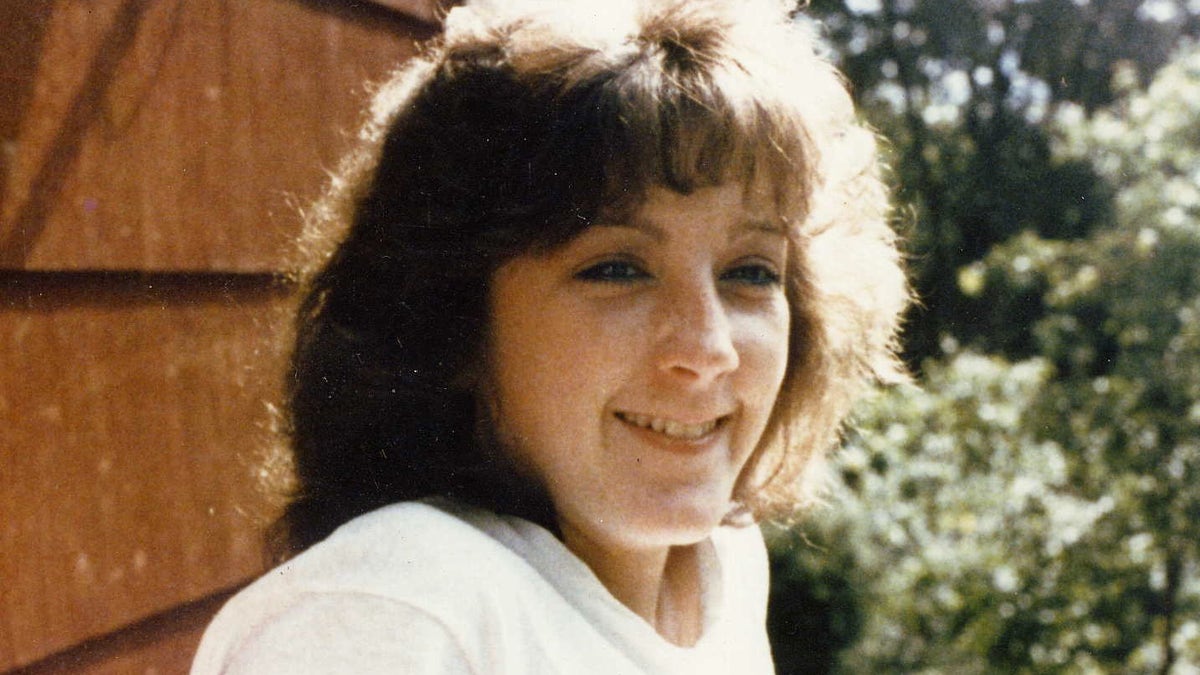
Joyce Stochmal
WATERBURY, Conn. – Joyce Stochmal was a 19-year-old college graduate and aspiring veterinarian when she was stabbed to death in August 1984 while walking to her job at an animal clinic in a small Connecticut town.
On Thursday, some 33 years after the murder, the man convicted of killing Stochmal was set free by a Connecticut judge in a move that stunned the woman's family, victims' rights advocates and state lawmakers.
"Justice is truly blind," the woman's parents, Charles and Mary Ann, said in a courtroom statement. "Our family still grieves … Time should heal but in our case it intensifies now with an individual found guilty and convicted to 60 years is going free after not even half of his sentence."
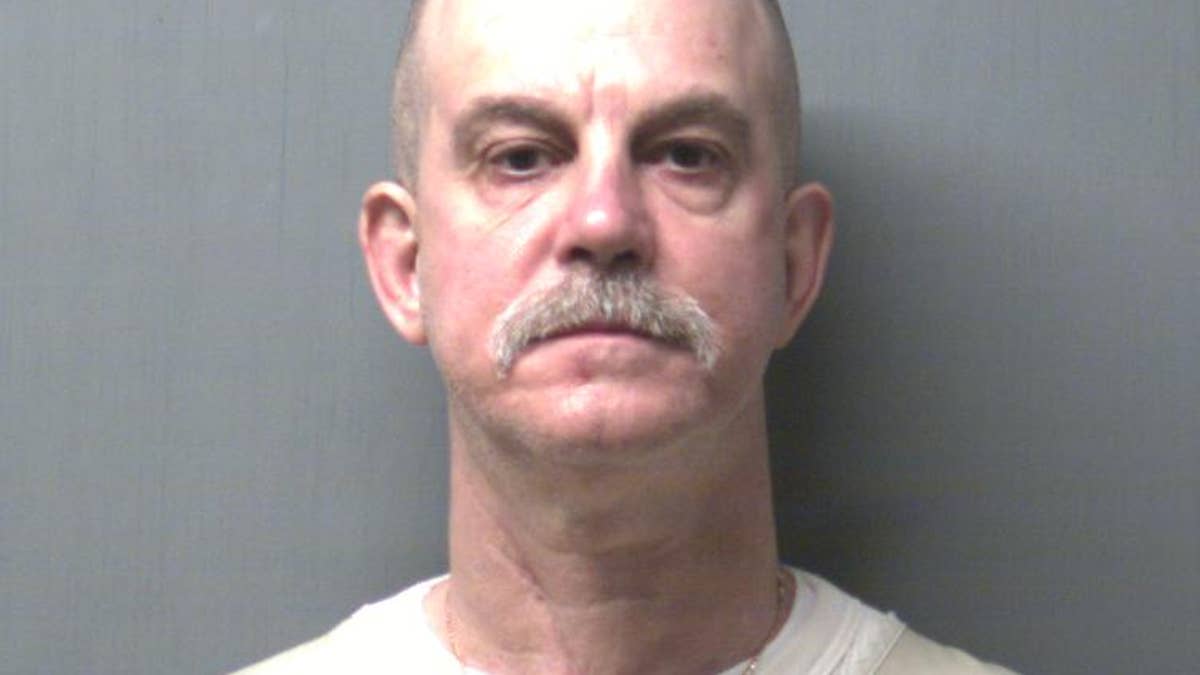
(David Weinberg)
David Weinberg, now 58, was convicted in 1989 of the murder of Stochmal, who was abducted, beaten and stabbed 17 times before her body was disposed in a lake in Newtown, Connecticut. Weinberg was sentenced to 60 years to life in prison without the possibility of parole.
But Weinberg's sentence was cut short Thursday -- after serving 26 years in prison -- and he emerged from the Waterbury District Superior Court able to live freely -- though he was not exonerated and his murder conviction remains intact.
Weinberg's "sentence modification" was made possible through the help of the Connecticut Innocence Project, a nonprofit, taxpayer-funded organization that works to exonerate wrongly convicted people through the use of DNA testing. Darcy McGraw, the group's director, told the judge Thursday that her client has always maintained his innocence and that there is no physical evidence linking him to the crime.
"The jury at the time of his conviction did not have before it the evidence that we have today," McGraw told the court. "The conviction in this case lacks integrity."
Stochmal's family, however, said state police and prosecutors launched an extensive investigation that proved Weinberg's guilt in a court of law -- and called Thursday's ruling "an atrocity." They also said the Connecticut Innocence Project has since presented no proof of his innocence.
"This was a complex circumstantial case that was diligently investigated by state police and prosecuted exceptionally well," the victim's older sister, Marianne Hefferman, told reporters outside the courthouse.
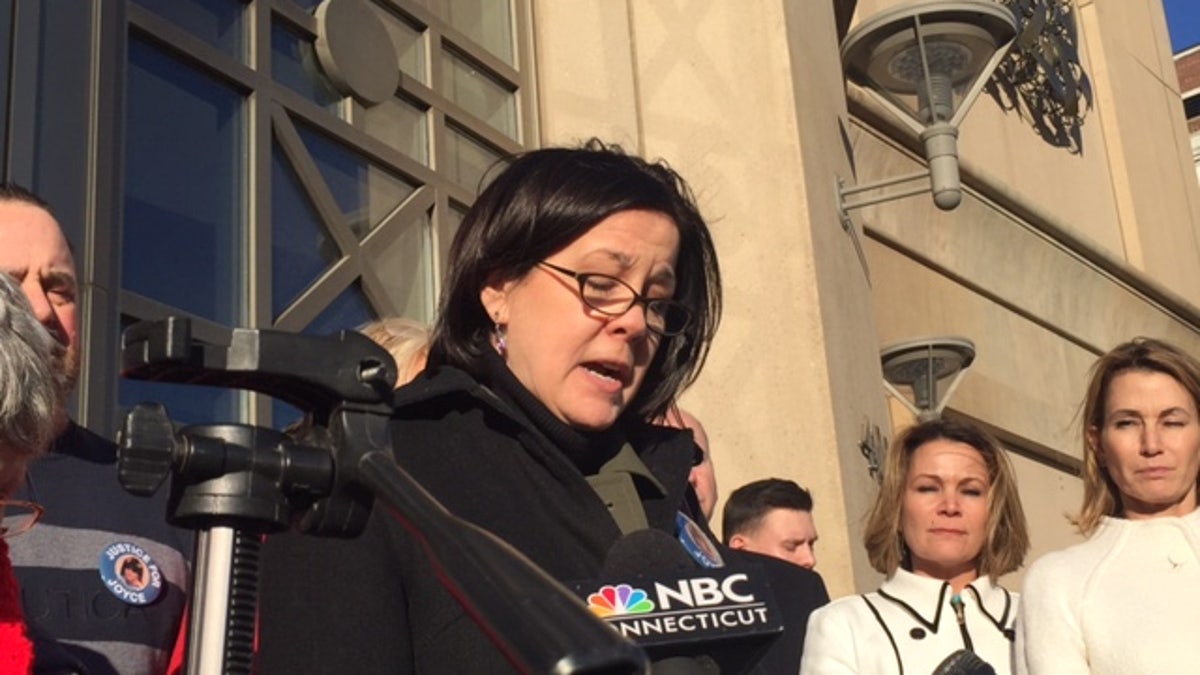
(Marianne Hefferman, Joyce's older sister)
"David Weinberg was found guilty then. He is guilty still," she said. "The fact that he is about to walk out of this courthouse as a convicted murderer is something that every resident in this state should be upset about. And he used tax dollars to do it."
On Aug. 3, 1984, Stochmal had dinner with her family in Seymour before leaving home at around 10:30 p.m. for an overnight shift at the Silver Hills Kennel in Ansonia. The young woman had just completed her associate degree in veterinary science at Becker Junior College.
Authorities said Weinberg was driving along Route 188 when he spotted Stochmal walking alone -- her purse and duffel bag in hand, which included a small makeup case, Calvin Klein jeans and an orange T-shirt.
According to police, Weinberg grabbed Stochmal and took her to an area beneath Steel Bridge, where he stabbed her 17 times and left her for dead in the waters of Lake Zoar. Her body was found three days later by a man and two young boys fishing at the lake.
Weinberg's girlfriend told state police investigators that his behavior in the days following the murder was suspicious. The woman, identified as Debby Lester, said Weinberg painted the rims of his car wheels black from white and noted that he stopped carrying a buck knife on his belt as was his habit.
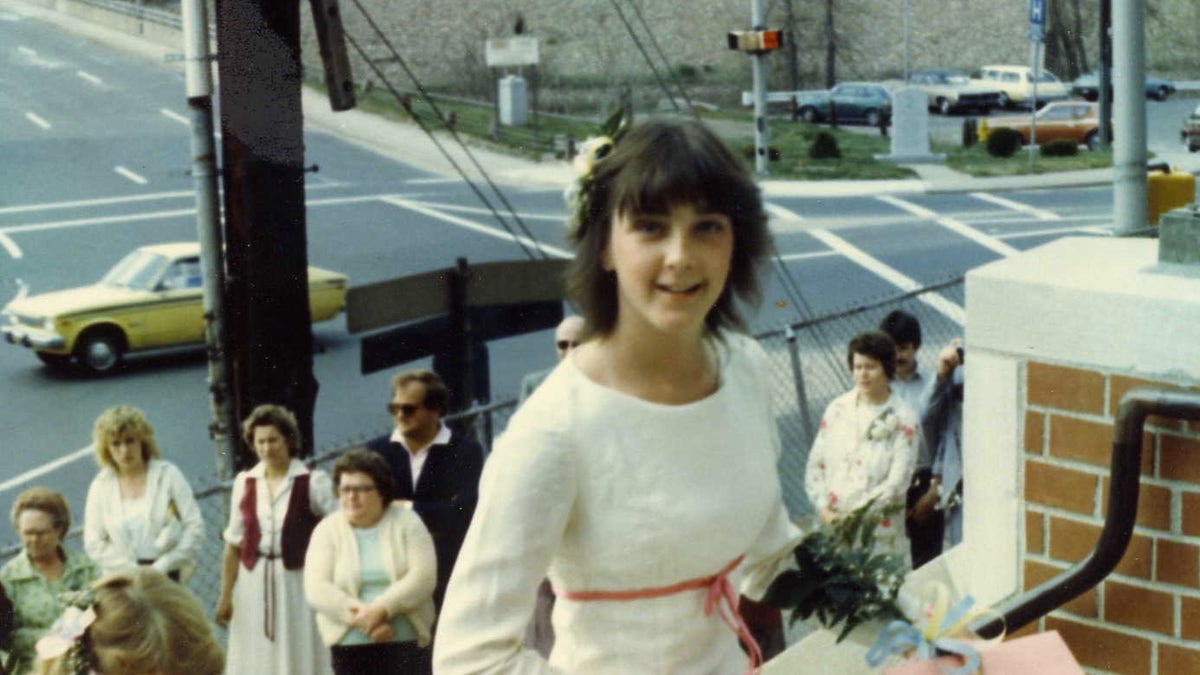
(Joyce Stochmal)
Lester also claimed Weinberg brought her to a small campfire near the Pomperaug River, where state police later recovered charred items belonging to Stochmal. Those items included orange fabric consistent with that of her T-shirt and a Calvin Klein button.
In May 1985, Weinberg was arrested and charged with murder. A jury found him guilty three years later after 10 hours of deliberations. His attorney, John R. Williams, immediately filed an appeal with the Connecticut Supreme Court. On Jan. 6, 1989, Weinberg was sentenced to 60 years to life in prison without the possibility of parole. After years of appeals, the state appellate court affirmed the murder conviction on Jan. 13, 2009.
After Weinberg's incarceration, a new defense attorney filed a habeas corpus action on his behalf, arguing Weinberg had "ineffective counsel" at his murder trial.
In 2010, the Connecticut Innocence Project (CTIP) -- one of five publicly funded Innocence Projects nationally -- filed a new habeas motion on Weinberg's behalf. Last month, State's Attorney Maureen Platt and McGraw signed off on a motion for "sentence modification."
That modification changes Weinberg's life sentence without possibility of parole to "time served." According to the court, Weinberg has served approximately 28 years of "real time" plus approximately 12 years of accrued "good time" credits -- totaling 40 years.
In testimony before Judge Roland Fasano of the Waterbury District Superior Court, both Platt and McGraw spoke about evidentiary problems in the case. Platt said, after speaking with CTIP, "We would have difficulty sustaining the conviction at the habeas level," noting there "wasn't just one problem" but several.
McGraw stressed the lack of physical evidence linking her client to the murder. She also said foreign DNA found underneath Stochmal's fingernail did not belong to Weinberg -- a finding she said "excludes" her client.
She also described Weinberg's then-girlfriend as "seriously mentally ill." Police reports from the time document the girlfriend as having a long history of mental illness, including delusions and hallucinations.
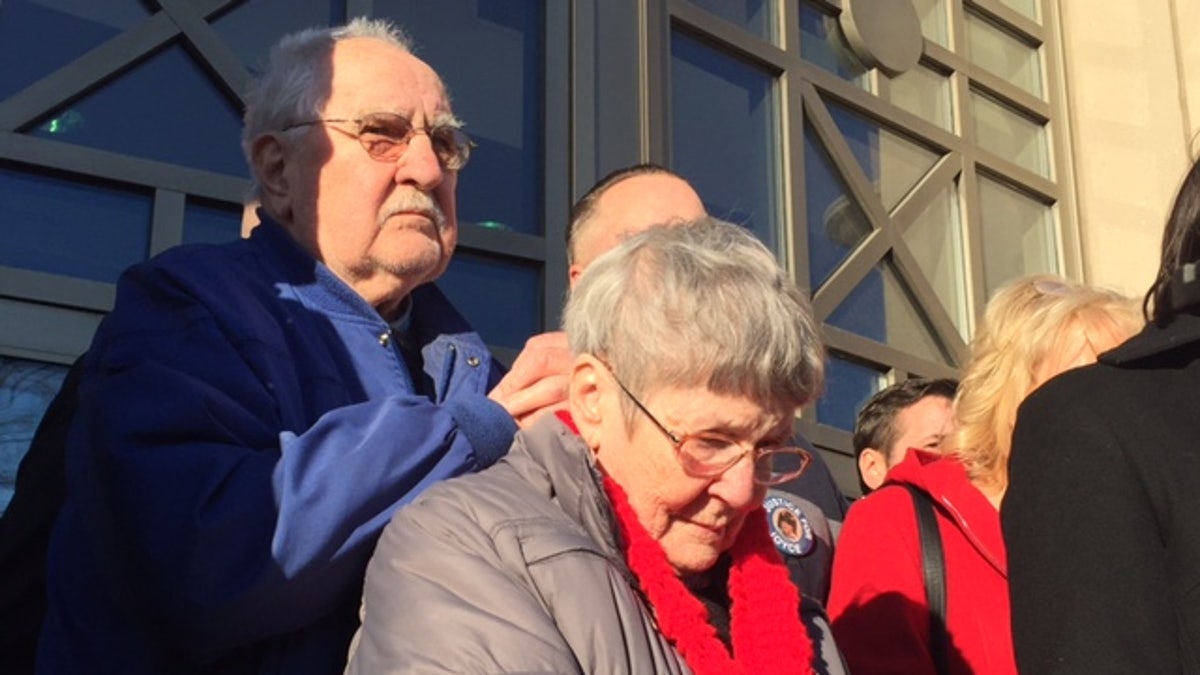
(Parents of Joyce Stochmal)
But Stochmal's family maintains the integrity of the investigation and the jury's 1989 conviction.
James Stochmal told the judge that in the case of Weinberg, CTIP "got it 100 percent wrong."
The judge, who called the resolution "appropriate," asked Weinberg Thursday if he agreed to waive any and all challenges to his murder conviction.
"Your standing is that of a convicted murderer -- do you understand that?" Fasano asked Weinberg, who stood expressionless, dressed in a dark suit with his hands folded.
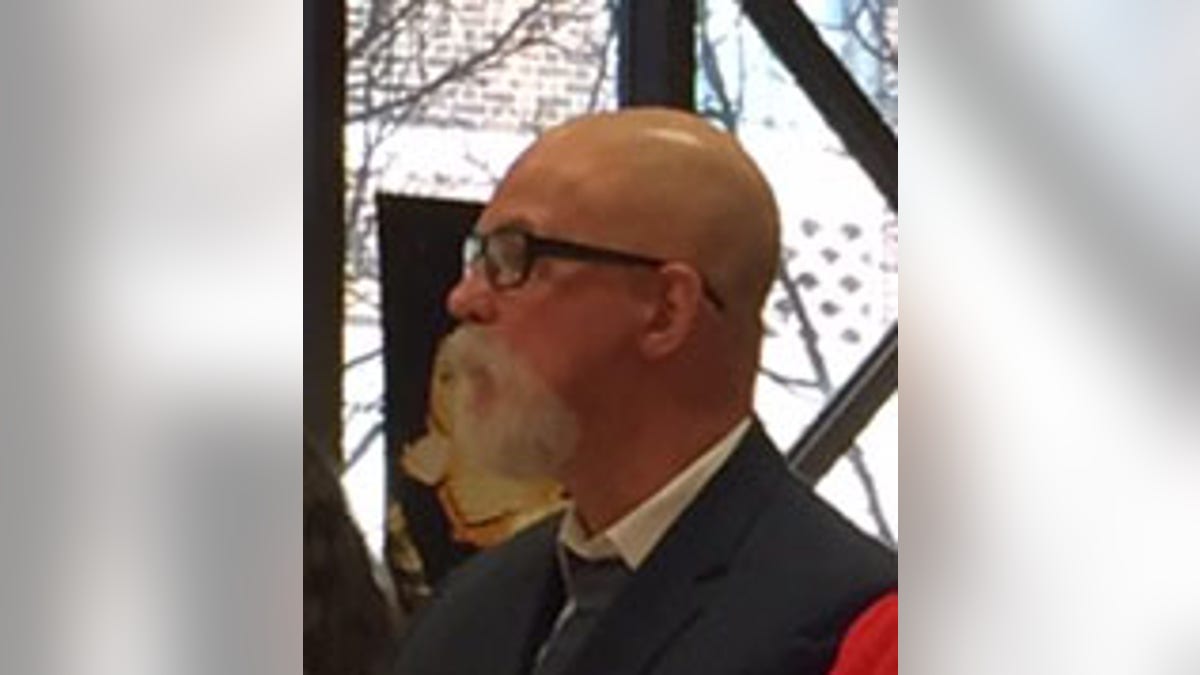
(David Weinberg in court)
"Yes, your Honor," he said.
Heffernan and her family -- who all wore pins saying "Justice for Joyce" -- said Weinberg's release reopened a wound her family has endured for 33 years. She also said she believes Weinberg -- who has a criminal record, including sexual assault -- poses a threat to the public.
"Now that the Innocence Project has facilitated the release of David Weinberg, it has opened the door for similar deals," Heffernan said.
"The Innocence Project did nothing to prove his innocence, but now David Weinberg can go anywhere, as a convicted murderer. No one will be watching him. He is free to harm again."









































